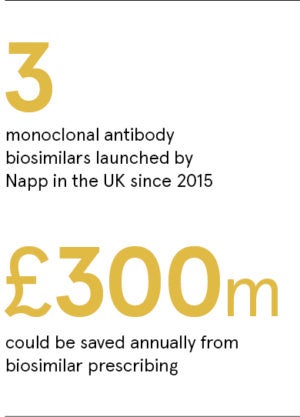
Hywel Day, managing director of Napp Pharmaceuticals
What has Napp’s role been in the uptake of biosimilars?
It is remarkable how far the NHS has come with biosimilars, when you think that the first monoclonal antibody biosimilar was launched in the UK in 2015 and a further four since then. In the space of a few short years, NHS policymakers and commissioners have helped to change attitudes throughout much of the service towards this new area of medicine, and ensured their rate of uptake has increased significantly. Prior to 2015, Napp had no experience of biosimilars and now, nearly four years on, our medical and scientific teams are at the forefront of biosimilar education, working alongside the British Biosimilars Association, healthcare professionals, the National Institute for Health and Care Excellence, and NHS England. Biosimilars is a classic example of how we work quickly, efficiently, but with precision and expertise. We’re a lean and agile business that can adapt to change and move quickly, that serves us, the NHS and ultimately the patients who use our medicines, well.
What does the future hold for biosimilars?
Delivering cost-effective medicines is the obvious, mutually beneficial goal for industry and the NHS. Our hope is that our efforts can build confidence in prescribing and help the NHS achieve the cost-saving potential of these important medicines – an estimated £300 million annually – which could be reinvested in staff and facilities to improve services for patients. It is also important that patients and the broader public understand that biosimilars are not just a cost-cutting exercise, but a way of delivering equally effective outcomes at sustainable costs.

The biosimilars landscape has shifted dramatically in a short period. How does Napp keep up with the constant evolution of the NHS?
We’ve been working side by side with the NHS since its inception. We recognise the increasing financial pressure on our health service. As the NHS environment has evolved, so has Napp, ensuring we have the right expertise to mirror what the NHS needs from us. We understand NHS priorities, what influences and drives their decision-making. Unlike many other pharmaceutical companies, we are part of a global network of independent companies, which gives us the freedom to make locally driven decisions quickly. When I joined the business, I was determined to shape us into a genuine, partnership-based
organisation. Placing partnership at the heart of everything we do and every relationship, from our wholesale distributors to NHS decision-makers. I see it happening daily in the organisation and I believe it’s innate at Napp to work in that way.
What is Napp doing for UK healthcare today and for the future?
We recognise that adding value comes in different shapes; it’s not always about price. Napp looks at the whole picture and just one of the many ways we deliver for our NHS partners is by providing educational programmes to meet their needs. The Napp Academy is one way we provide high-quality training and educational resources to healthcare professionals, supporting them in delivering the best possible care for their patients. Our education activities don’t stop with healthcare professionals. We believe in a collective responsibility to contribute to the education of the next generation and, with that in mind, we set up the Science Ambassadors scheme. The scheme, which runs across our wider network of independent associated companies in the UK, provides free, exciting, hands-on science activities for local primary schools, and careers support to secondary schools and colleges within a 20-mile radius of our Cambridge head office. Formed in 2005, the scheme reaches more than 10,000 young people each year.
And what are Napp’s plans for the challenges facing the UK health environment?
We’ve developed our working practices to ensure we can act quickly and efficiently, and are able to help our partners address challenges head on. I believe this expertise will be increasingly important as we confront one of the most complex and challenging futures the industry has ever faced. With so much uncertainty around Brexit and increasing concerns from scientists on the impact on life sciences, strong partnerships are more important now than ever to help find smart solutions.
For further information please visit napp.co.uk
Date of preparation November 2018 UK/CORP-18045


